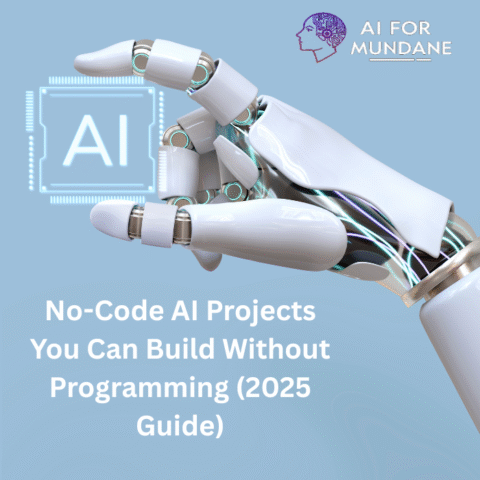New Age SEO
AI for Mundane
Learn how to replace outdated SEO tactics with AI-powered strategies and truly dominate search rankings. This guide is for marketers, small business owners, freelancers, and content creators who want to stay ahead in the rapidly evolving AI era.
Table of Contents
The Death of Traditional SEO
The Rise of AI in Search
AI Tools That Transform SEO
Prompt Engineering for SEO Success
Creating Topical Authority with AI
AI for Voice Search & Multilingual SEO
How to Future-Proof Your SEO Strategy
Monetizing Your SEO Skills in the AI Era
Bonus: Free AI SEO Tools List
Chapter 1: The Death of Traditional SEO
There was a time when SEO was simple: more keywords and more backlinks meant higher Google rankings. Today, that formula can actually hurt your visibility.
Search engines now use advanced AI to understand language, user intent, and how topics connect. Traditional SEO is changing fast.
Why traditional SEO is dying
Keyword stuffing is penalized by Google’s language models.
Backlink schemes trigger SpamBrain filters.
Thin or shallow content is flagged by Google’s Helpful Content System.
AI-generated snippets (like SGE) often show up above regular search results, pushing your pages lower.
Real examples
A student blog stuffed with keywords saw traffic drop by 50% after 2023.
A travel site using link farms was completely de-indexed.
E-commerce blogs lost rankings to Reddit and YouTube summaries that Google’s AI surfaced.
A tech blog that still ranked number one lost 37% of clicks because AI snippets answered the query first.
Takeaway: SEO must now serve real users first, not just algorithms.
Chapter 2: The Rise of AI in Search
AI has completely changed how search rankings work.
Key AI technologies shaping search
RankBrain interprets what people really mean, beyond keywords.
BERT understands word context across entire sentences.
Google’s SGE creates AI summaries that appear before traditional results.
Bing’s ChatGPT turns search into an interactive conversation.
YouTube’s AI transcribes speech to text, using it to rank videos.
What this means for your SEO
Keywords alone aren’t enough; your content needs to be relevant, structured, and helpful.
AI snippets and answer boxes often steal your traffic.
Long-form, clear, well-organized content now performs best.
Tip: Write for both humans and AI. Use clear headings, FAQs, and a natural, conversational tone.
Chapter 3: AI Tools That Transform SEO
Here’s a toolkit that blends AI with traditional SEO to boost your strategy.
For keyword research
Keyword Insights
WriterZen
NeuralText
For writing content
ChatGPT
Jasper
Scalenut
Frase
For on-page optimization
Surfer SEO
MarketMuse
PageOptimizer Pro
For technical SEO and schema
Screaming Frog with GPT
SEO.ai
ChatGPT’s Code Interpreter
For visuals and video
Canva with AI tools
Lumen5 or InVideo for video content
Descript for editing audio and video
Free tools worth exploring
ChatGPT
Scalenut free trials
Canva
AnswerThePublic
Google Trends
Power tip: A combination of keyword AI, content AI, an optimizer, and visuals gives you a strong competitive edge.
Chapter 4: Prompt Engineering for SEO Success
Knowing how to give clear instructions to AI separates amateurs from pros.
A simple prompt formula
Action + Topic + Tone + SEO context + Length
Example prompts
Blog post:
Write 1200 words on “Dropshipping in India” with a meta description and FAQs.Meta titles:
Give me five SEO meta titles for “Save Tax in India.”Schema markup:
Generate JSON-LD schema for SmileBright Dental in Andheri West.Multilingual:
Translate a tax-saving guide into Hindi in a friendly tone.
Tip: Always guide the AI with the right tone, structure, and clear user intent.
Chapter 5: Creating Topical Authority with AI
Being a topical authority means Google sees you as the trusted expert on a subject.
How to build topical authority
Pick a broad theme, such as personal finance.
Cluster related subtopics using ChatGPT or WriterZen.
Write interlinked articles using ChatGPT plus Surfer SEO for structure.
Create a main hub page that links to all these articles.
Track performance in MarketMuse or Google Search Console.
A quick success story
A SaaS company created a content cluster around GST topics and quadrupled their leads in just 90 days.
Tip: The more your content connects around a topic, the more trust you build with Google.
Chapter 6: AI for Voice Search and Multilingual SEO
Voice search is growing rapidly, and regional languages are especially important in markets like India.
Tips for voice SEO
Use natural language queries—how someone would actually speak.
Include short, snippet-style answers.
Organize content in a Q&A format.
Expanding into regional languages
Use ChatGPT for translations that sound human.
Try Bhashini for Indian languages like Hindi, Marathi, Tamil, or Gujarati.
Real-world example
A local business in Mumbai tripled their traffic by publishing blogs in Hindi, Marathi, and Gujarati.
Some helpful tools for this include Google Translate, Bhashini, SpeechTexter, and ChatGPT.
Chapter 7: How to Future-Proof Your SEO Strategy
Future-proofing means staying ahead of algorithm changes.
Here’s what to focus on
Embrace EEAT (Experience, Expertise, Authority, Trust).
Repurpose content into videos, audio clips, carousels, and other formats.
Mix AI tools with your own creativity.
Use Google Search Console plus GPT to identify gaps and optimize content.
Keep your approach flexible: include blogs, videos, snippets, schema, and local SEO.
Quick checklist:
EEAT, voice search, visual content, multilingual reach, and automation across platforms. SEO isn’t just one format anymore—it’s an entire system.
Chapter 8: Monetizing Your SEO Skills in the AI Era
SEO opens multiple income streams, especially when paired with AI.
Ways to monetize your skills
Freelance writing, audits, or schema markup projects (₹8,000 to ₹50,000 per month).
Start a lean AI-driven agency that scales with a small team.
Build niche websites for AdSense, affiliate sales, or digital products.
Sell templates, prompt packs, or Notion dashboards.
Offer SEO training to small businesses, charging around ₹2,000 per hour.
Example
A blogger used AI to scale up to 90 articles in six months and now earns around ₹1.2 lakh each month.
Tip: Build your personal brand so that clients approach you, instead of you chasing them.
Bonus Chapter 9: Free AI SEO Tools List
Best free tools by category
For keywords:
Keyword Surfer
AnswerThePublic
Ubersuggest
For content:
ChatGPT
Copy.ai (up to 2000 free words)
Rytr (free credits)
For optimization:
Surfer free outlines
Hemingway App
SEO Minion
For visuals and video:
Canva Free
Lumen5 (with watermark)
Remove.bg
Smart free stack
Use Google Search Console, ChatGPT, Canva, Bhashini, and Ubersuggest to run a full SEO project—without spending anything.
Spread the word
If this guide helped you rethink SEO in the AI era, share it with other marketers, freelancers, or small business owners. Let’s help more people future-proof their content strategies and thrive in this new landscape.






